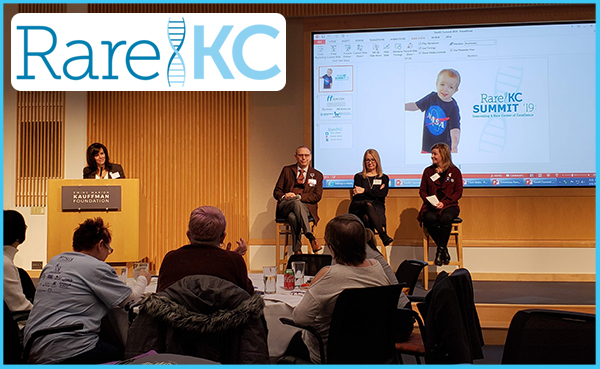
RareKC held their 4th Annual Stakeholder Summit on March 4th to gather individuals, families and members of the life science and business community as an initial step in establishing Kansas City as a Center of Excellence for Rare Disease.
The day started with keynote speaker, Mark Dant, telling his story of rare: how his seemingly typical 3-year-old was diagnosed with an incurable and untreatable disease known as MPS-2. Mark and his wife started the Ryan Foundation and raised money any way they could think of, all in the hopes of being able to save their son. This foundation found and funded a researcher who developed an enzyme replacement therapy that ultimately saved his son’s life, and many others.
The discussion then shifted to focus on the value of coordinated care, or in other words, developing healthcare delivery models where patients with complicated conditions can access a variety of specialists all at the same location in a single day. The audience heard examples of innovations and best practices from The University of Kansas’ Cystic Fibrosis Clinic, the Children’s Mercy Turner Syndrome Clinic, and the ALS Association..
The summit highlighted several speakers, including:
- John Spertus, Clinical Director at Saint Luke’s Mid America Heart Institute, who inspired attendees to think about the desired outcomes of being a Center of Excellence for rare disease and the best metrics to use to measure success.
- Kim Kimminau, Associate Director of Frontiers: KU Clinical and Translational Science Institute, who addressed the challenge of facilitating communication between highly technical researchers and various non-technical audiences.
- Tomi Pastinen, Director of Children’s Mercy Center for Pediatric Genomic Medicine, provided a window into some of the current efforts in the region that are leading the way, specifically around genomic sequencing and helping rare patients get to a diagnosis faster. He described the Center’s one-of-a-kind program to sequence and (hopefully) provide a diagnosis for cold case patients, children who are sick but who do not have a definitive diagnosis. If Children’s Mercy (and Kansas City) can be seen as a place where frustrated patients can go to get to a diagnosis, it’s easy to see how the region could leverage that strength into becoming a hub for rare disease research and care.
- Dennis Ridenour, CEO of BioNexus KC, and his wife Janell concluded the summit. They shared their family’s rare journey and the challenges they face daily in helping their son, Theo, grow and develop. Despite everything they’ve been through, they are thankful to be in a region that has rallied around rare disease and has the assets and strengths to change the rare journey for patients like Theo.
RareKC is working hard to establish Kansas City as a Center of Excellence for rare diseases. This event, the presence of assets like the Pediatric Genomic Sequencing Center at Children’s Mercy Hospital, and the development of recognized best practices around coordinated care at KUMC and CMH all indicate how supportive the region is of rare diseases, and will ultimately help RareKC fulfill its mission to accelerate the diagnosis, care, and treatment of rare conditions.
